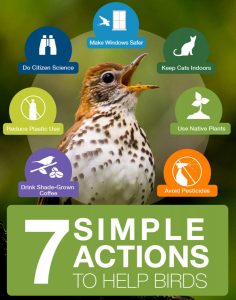By: Kaylee Paffrath

Helping birds has never been more important than it is right now. The Cornell Lab of Ornithology has released a devastating, first-ever, comprehensive assessment of the net population changes of the North American bird populations. The report finds that our common backyard bird populations such as warblers, finches, blackbirds, and sparrows have taken the hardest hits accounting for more than 90% of the 2.9 billion birds lost since 1970.
Ken Rosenberg, Cornell Lab of Ornithology conservation scientist, said: “These bird losses are a strong signal that our human-altered landscapes are losing their ability to support bird life and that is an indicator of a coming collapse of the overall environment.” The scientists involved in the study stated that their work doesn’t just show a massive loss of bird life, but a pervasive loss that reaches into every biome in North America.
What can you do to help? There are many ways you can help birds in your own backyard. The 2019 Project FeederWatch kicks off on November 9th and runs through early April. This event is held annually and can be done from the comfort of your own home.
Project FeederWatch is the winter long survey of birds that visit feeders at backyards, nature centers, community areas, and other locations in North America. FeederWatchers periodically count the birds they see at their feeders from November through early April and submit their counts online to Project FeederWatch. The data collected from these submissions help scientists track broad-scare movements of winter bird populations and long-term trends in bird distribution and abundance such as that released in the Cornell Lab study citing bird decline.
The scientists at Cornell Lab of Ornithology say there are 7 simple ways to help birds:
1. Make Windows Safer, Day and Night.
2. Keep Cats Indoors
3. Reduce Lawn by Planting Native Species
4. Avoid Pesticides
5. Drink Coffee That’s Good for Birds
6. Protect Our Planet From Plastics
7. Watch Birds, Share What You See
Although many results from the study were devastating, there were also many positive results. Raptors saw a population growth of 15 million since 1970 and woodpeckers saw a population growth of 14 million all thanks to conservation efforts and pesticide reductions.
To Learn More Visit: www.ProjectFeederWatch.org www.Birds.Cornell.edu
